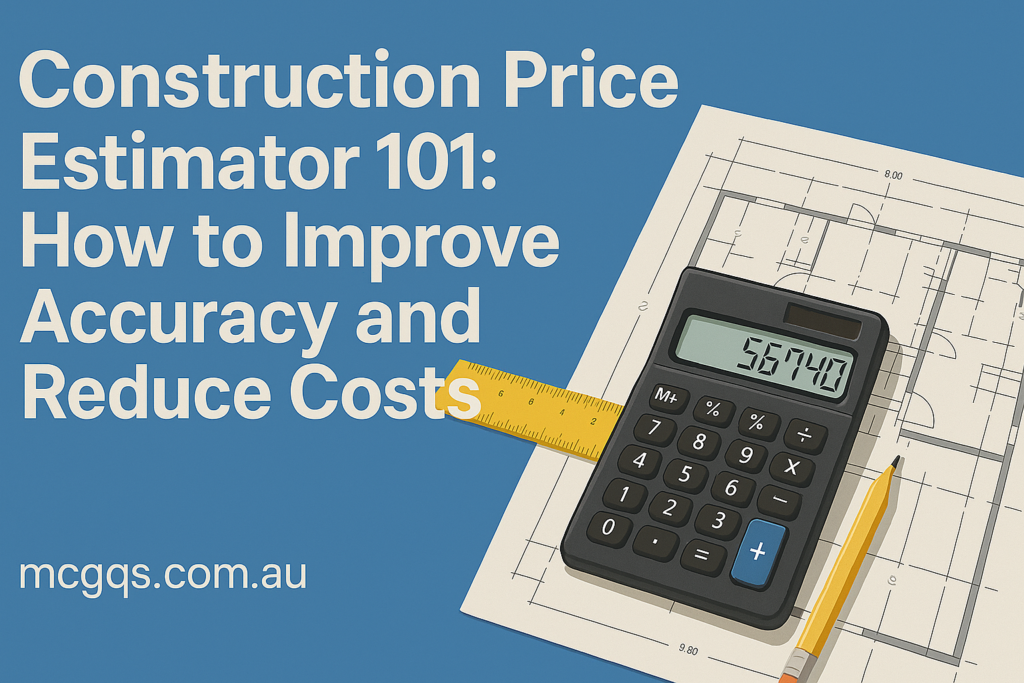Construction Price Estimator 101: How to Improve Accuracy and Reduce Costs

In the realm of construction, precise cost estimation is a pivotal component that can make or break a project. The ability to accurately predict expenses ensures the project remains within budget and helps in avoiding costly overruns. For businesses looking to optimize their construction projects, employing a reliable Construction Estimator is a must. In this guide, we will delve into the essentials of a Construction Price Estimator, discussing how to enhance its accuracy and reduce overall costs.
Understanding the Role of a Construction Estimator
A Construction Estimator is a professional tasked with determining the total cost of a construction project. This includes direct costs like labor, materials, and equipment, as well as indirect costs such as overheads and contingencies. Accurate cost estimation requires a deep understanding of the construction process, market trends, and financial analysis. A Construction Price Estimator uses various methodologies and tools to provide a comprehensive cost projection, ensuring stakeholders can make informed decisions.
The Importance of Accuracy in Cost Estimation
Accuracy in construction cost estimation is crucial for several reasons:
Budget Adherence: Precise estimates ensure that the project remains within the allocated budget, preventing financial strain on the company.
Resource Allocation: Accurate cost projections help in the efficient allocation of resources, ensuring that funds are appropriately distributed across different project phases.
Risk Management: By predicting potential costs accurately, companies can mitigate risks associated with unforeseen expenses.
Client Confidence: Providing clients with accurate estimates builds trust and credibility, fostering long-term business relationships.
How to Improve Accuracy in Construction Price Estimation
Improving the accuracy of a Construction Price Estimator involves a combination of technological tools, best practices, and continual learning. Here are some strategies to enhance estimation accuracy:
1. Utilize Advanced Software Tools
Modern Construction Estimators rely heavily on sophisticated software tools that offer detailed cost analysis and project management capabilities. Software such as CostX, PlanSwift, and Bluebeam Revu can streamline the estimation process, providing real-time data and analytics. These tools help in creating precise digital takeoffs, automating calculations, and reducing the likelihood of human error.
2. Conduct Thorough Site Inspections
A thorough site inspection is fundamental to accurate cost estimation. Understanding the site conditions, accessibility, and potential challenges allows the estimator to account for site-specific factors that could influence costs. Regular site visits and detailed documentation can provide invaluable insights that improve estimation accuracy.
3. Leverage Historical Data
Historical data from previous projects can be a goldmine for Construction Estimators. Analyzing past project costs, timelines, and outcomes can provide benchmarks and reference points for new estimates. This data helps in identifying patterns and making informed predictions about future costs.
4. Stay Updated with Market Trends
Construction costs are influenced by market trends, including fluctuations in material prices, labor rates, and economic conditions. Keeping abreast of these trends ensures that the Construction Price Estimator provides realistic and current estimates. Subscribing to industry publications, attending trade shows, and networking with peers are effective ways to stay informed.
5. Incorporate Contingency Planning
Unforeseen events and changes are inevitable in construction projects. Incorporating a contingency budget into the cost estimate accounts for potential risks and unexpected expenses. A common practice is to allocate 5-10% of the total project cost as a contingency fund, providing a financial buffer against uncertainties.
Reducing Costs Without Compromising Quality
While accuracy is paramount, the goal is also to minimize costs without sacrificing quality. Here are some strategies to achieve cost efficiency:
1. Value Engineering
Value engineering involves evaluating project elements to identify cost-saving opportunities without compromising functionality or quality. This could include selecting alternative materials, optimizing design features, or streamlining construction processes. Engaging in value engineering early in the project can yield significant cost savings.
2. Competitive Bidding
Obtaining multiple bids from contractors and suppliers fosters a competitive environment, driving down costs. However, it’s essential to evaluate bids not only on price but also on the contractor’s reputation, experience, and ability to deliver quality work.
3. Efficient Project Management
Effective project management practices can lead to substantial cost reductions. This includes clear communication, regular progress monitoring, and proactive problem-solving. Utilizing project management software can enhance coordination and ensure that the project stays on track.
4. Prefabrication and Modular Construction
Prefabrication and modular construction techniques can significantly reduce construction time and labor costs. These methods involve assembling components off-site in a controlled environment, resulting in faster and more efficient on-site installation.
5. Sustainable Practices
Sustainable construction practices not only benefit the environment but can also lead to cost savings. Energy-efficient designs, waste reduction, and recycling materials can lower operational costs and enhance the project’s overall value.
Conclusion
In the competitive world of construction, employing a skilled Construction Estimator and leveraging a reliable Construction Price Estimator tool are crucial for project success. By focusing on accuracy and cost efficiency, companies can ensure that their projects are delivered on time, within budget, and to the highest quality standards. For businesses looking to excel in the construction industry, adopting these best practices and staying informed about the latest trends and technologies is essential.
By understanding and implementing these strategies, construction professionals can navigate the complexities of cost estimation and achieve successful project outcomes in the dynamic market of New South Wales.
